 Raise a Glass to Freedom
Raise a Glass to Freedom
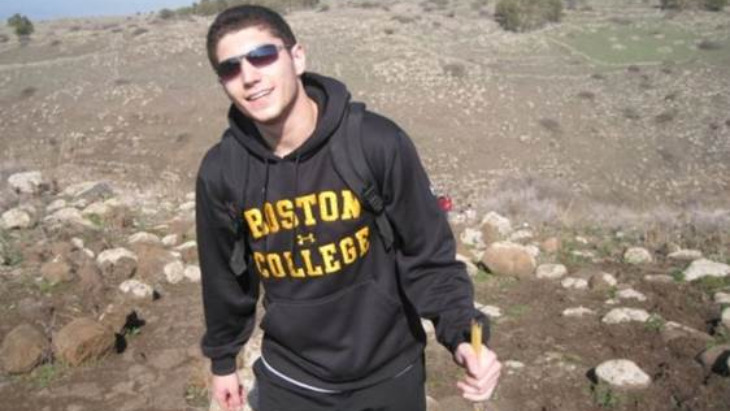

10 min read
Anytime the professor, a pastor, pondered a question about Jewish practice, she’d call on me and wait for my answer. I never had one.
I was a daydreaming teenager looking forward to another summer afternoon of no cares and good times. I was walking through Bryant Park in Midtown Manhattan, waiting to meet up with a group of friends, when a voice called out, “Excuse me…” Standing before me was an Orthodox Jew dressed in classic monochrome Hassidic attire. We locked eyes, his hopeful and kind, and he asked, “Are you Jewish?...”
As he tried to get his next few words out, presumably a request of some kind, I quickly replied, “No, sorry,” and continued on my way. He didn’t realize it but I was apologizing for lying about my Jewish identity. As many generations back as we can remember, our family spoke Yiddish in the home, and since feudal times have had ‘Yivreika,’ or ‘Jew’ in Russian, printed on our birth certificates and documentation. We even fled the USSR due to persecution and emigrated to the United States just before the fall of the Communist regime.
#I would sometimes forget we were Jewish altogether until some antisemitic incident reminded me of our true identity.
In Russia, we were called kikes, and in America, we were only known as ‘Russians’, even though we were naturalized citizens, as patriotic as the next homegrown New Yorker. To say that we assimilated would be a stretch since we never practiced any religious customs to begin with. I would sometimes forget we were Jewish altogether until some antisemitic incident reminded me of our true identity.
But that Orthodox man didn’t look to me like an antisemite. In fact, he seemed to be reaching out. I’ll never know if he needed help completing a minyan to recite mourners' kaddish or if he was inviting me to put on tefillin. Both would have been my first time. When I reflect back on it, I feel some pangs of regret and shame for having denied my heritage so flippantly. But back then, being Jewish wasn’t on my radar and I felt relieved to be able to just carry on carelessly with my life.
It wasn’t until I was 21 years old that I realized Jewish history didn’t begin with the Holocaust. I was fulfilling my theology requirement during my junior year in Boston College, a Jesuit school, where I learned about 1,500 years of oppressive behavior by the Church against Jews around the world. My guidance counselor insisted that I take a class called The Christian Roots of Antisemitism. An Israeli exchange student buddy of mine and I were the only Jews in the class of over one hundred.
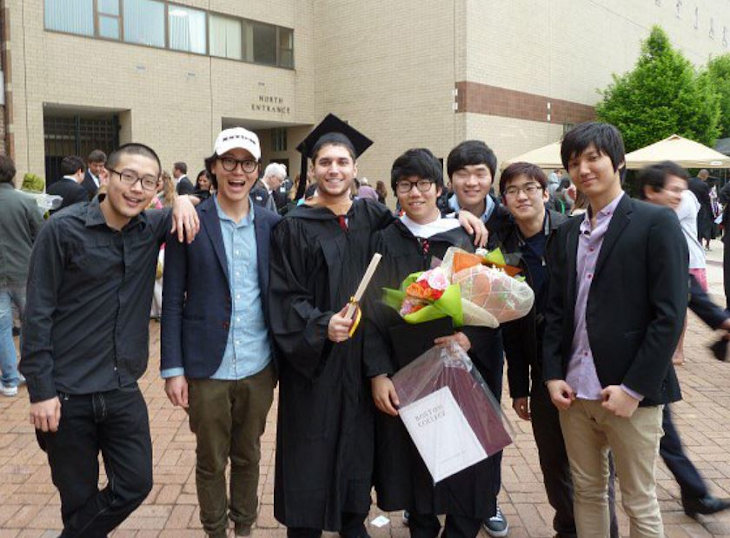 Graduation Day
Graduation Day
Anytime the professor – a pastor – pondered a question on or clarification of Jewish practice, she’d look at us and call us by name, and a hundred sets of eyes would stare at us waiting to hear an answer. I never had one.
One day, she asked me to stay for a moment after class and told me ever so bluntly, “You’re supposed to be the ‘People of the Book,’ but you’ve never even opened the darn thing!” She’s right, I thought as I scurried to the next class, a bit shaken. But I never had any desire to open that Book, nor any opportunity to ever learn the ancient theology of my people in an authentic way. That was all about to change.
That winter, I went on a Taglit Israel Outdoors Birthright trip with a group of thirty unaffiliated Jews of Russian background. The day after we arrived, a war broke out. Operation Cast Lead was an aerial and ground assault on Hamas targets in the Gaza strip in response to the indiscriminate firing of rockets into civilian centers within Israel. As the conflict escalated, I could palpably feel the unity between the Jewish people increasing.
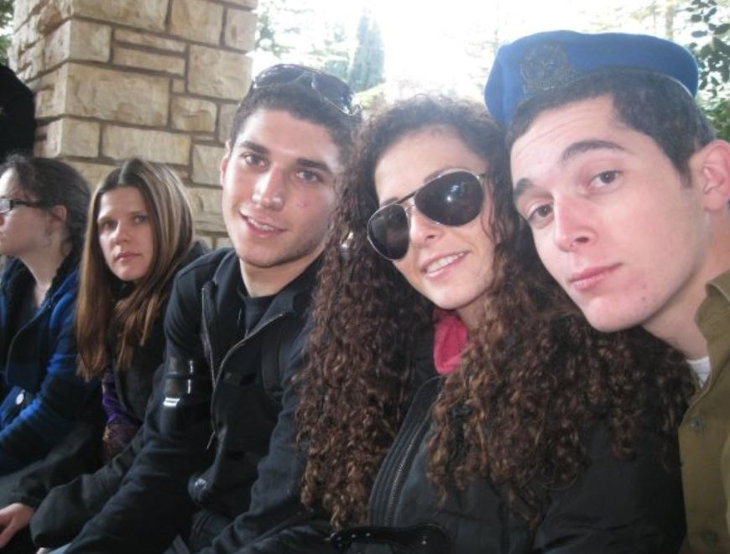 On Birthright with an Israeli soldier
On Birthright with an Israeli soldier
On the first day of ground combat, a childhood friend of one of the IDF soldiers accompanying our trip was killed in an exchange of fire. The soldier was devastated and we all sympathized. Our Western sensitivities kicked in: “Why do Jews live here and put up with this terrorism, violence, and conflict? Is this land, as opposed to living on any other, really worth it?” We didn’t have any context or understanding of the significance of the land Israel and its profound connection to the Jewish people. But for some reason, we were proud to be Jewish and to be back in our ancestral homeland, an enigma in retrospect.
When I got back to campus, everything changed. I walked into a wall - literally. A barrier had been constructed by the newly-formed Students for Justice in Palestine, an organization founded by a Jewish faculty member. Buckets of red paint were spilled on the unauthorized wooden monument constructed in the middle of the green on the main campus, along with signs labeling Israel an apartheid, occupying colonial power, and fabricated accusations of Israel using poisonous gases on innocent Gazan civilians.
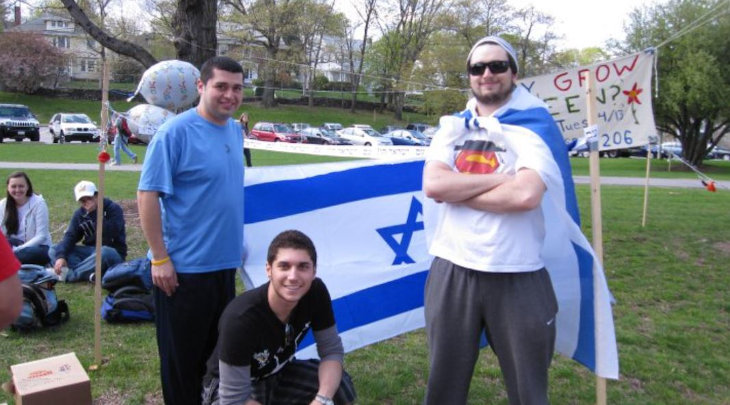 Defending Israel on campus
Defending Israel on campus
My Israeli buddy David and I uncharacteristically rallied with signs successfully dispelling the misinformation presented by the SJP activists and we soon started an organization called Eagles for Israel. We were a diverse group of students who threw cultural events, hosted think tanks and diplomats for discussion, and even managed to get Israeli Apartheid Week banned on our campus.
That’s when I met a rabbi for the first time. Rabbi Chananel Weiner opened that closed book for me, introducing me to Jewish philosophy and ethics, and to my first Shabbat experience. The only reason I finally accepted his invitation to the festive family dinner was because I didn’t want to be rude and keep saying no. I expected strange rituals, uninspired cuisine, and dogmatic lectures about absolute morality. Instead, my friends and I received a delicious lavish meal with fine wines and craft beers, fascinating insights into our traditions, and lively conversation in an atmosphere of openness and acceptance. Our organization adopted as its new routine Friday night “pre-games at the Rabbi's house.”
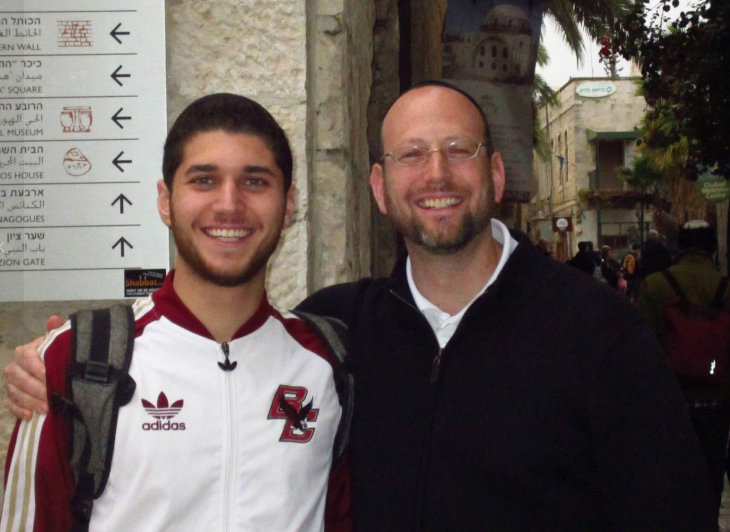 Me and Rabbi Chananel Weiner
Me and Rabbi Chananel Weiner
I was struck by how he lived these timeless values in a contemporary way. His home was filled with love – love for one another, for the Jewish people, and for all humanity. I had countless conversations about living a more meaningful, fulfilling life. He cared about our student organization standing up for Israel, and he cared about us as college students trying to figure out our aspirations and career paths.
Before my graduation, Rabbi Weiner challenged me. “What kind of Jewish leader do you want to be? Someone who happens to be born Jewish telling others what to do, or someone leading by example who inspires change through their own action and resolve. Go back to Israel and learn about what it actually means to be Jewish and then come back and do whatever it is you planned on doing. Just do it as an informed Jew.”
Before diving straight into my career, the summer after my graduation was my last shot at receiving the Jewish education I never had. I went back to Israel, this time on an Aish trip for young, unobservant men in their twenties. A dozen of us came together from all over the United States. We bonded on adventurous excursions in nature all over Israel and boisterous nights out on the town. In Jerusalem, insightful, honest, and thought-provoking talks with rabbis, scientists, historians, relationships experts, and lay leaders shattered many of my misconceptions about Jewish practice and beliefs.
After being a self-proclaimed atheist my entire adolescent life, I was invited to explore rational evidence for the existence of a Divine Creator. The rabbis were open to my challenges and welcomed debate. The overwhelming body of evidence for the existence of an Infinite Creator triggered a crisis of faith in my atheism. I was undergoing a major paradigm shift.
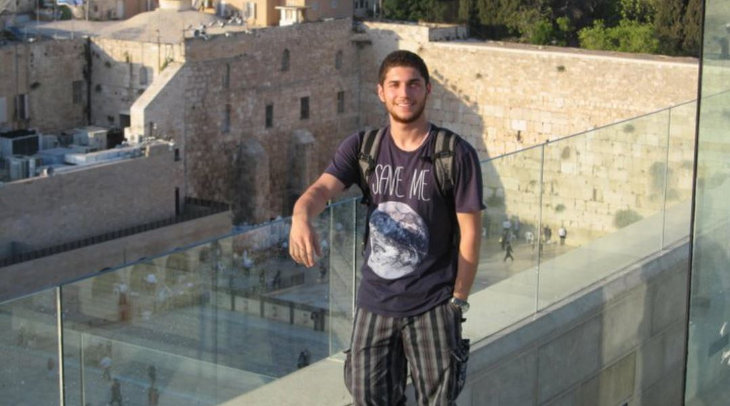 Visiting Jerusalem
Visiting Jerusalem
If everything in this world was created, then it stood to reason that it must be for a purpose. It wasn’t a random accident. And I also realized that it makes sense that we can and must know what that truly intended purpose is – something every religion claims to have a handle on.
For the first time, I delved into Judaism’s unique claim of national revelation at Mount Sinai. Evidence for the Divine origin of the Torah was being offered but I wasn’t ready to take it seriously. So I ran.
I returned to New York City and tried to pretend that this transformative experience never happened. But as the first subsequent Shabbat approached, I spontaneously decided I’d try to keep it. I told my friends that I wouldn’t be joining them at the nightclub that evening, nor at the beach the following day, and I did my best to prepare for Shabbat based on the little bit I knew. But the spirit of the day was palpable as my immediate family and I spent many hours dining and shmoozing, discussing the many profound ideas I learned in Israel.
I came away from that Shabbat with a new resolve to return to Jerusalem to continue my exploration. Too many questions were left unanswered. And I was still illiterate in my own people’s language and traditions. I told my parents, “If I can spend four years learning how to maximize profits and minimize costs in business school, then I can spend four months learning how to live a more meaningful and spiritual life in Jerusalem.”
They had their reservations but ultimately came to understand that my longing to reconnect our family tree with timeless Jewish beliefs was in no way a rejection of what they had taught me and their loving efforts to raise me.
So I returned to Aish as an investment to deepen my understanding of my Jewish heritage, the world around me, and ultimately myself. The last thing I imagined was becoming a practicing Jew, let alone a rabbi. But the more time I spent at Aish, the more empowered I became to make healthy life choices. Ultimately, I found my calling in Jewish education and stayed, seeing the value in deepening my understanding of Jewish wisdom so I can live it and teach it and spread the wealth with all those who, by no fault of their own, were never privy to an authentic Jewish education. Eventually, I reunited with a young woman from my past who shared a similar story as me and we got married and settled in Jerusalem.
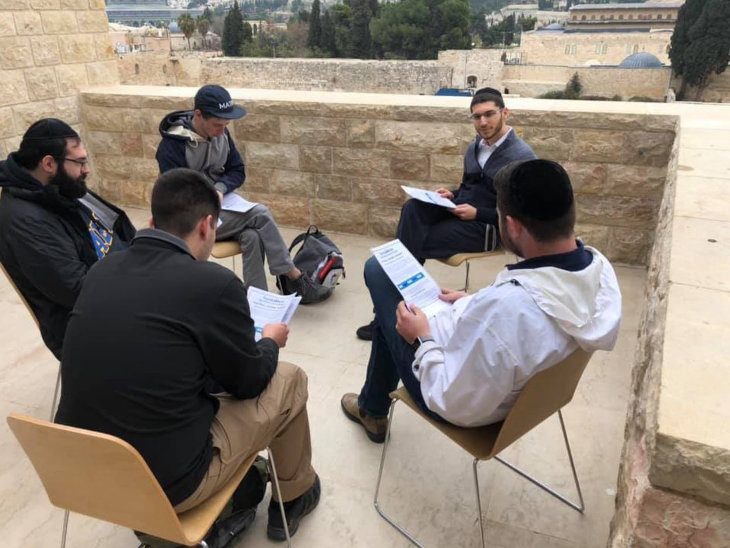 Teaching at Aish in Jerusalem
Teaching at Aish in Jerusalem
In the beginning, I ran from my Jewish identity. Clueless and uninspired, I viewed it as dreary and inconvenient. My exposure to Jewish wisdom changed the course of my life. My mother once told me, “You’d make a great teacher.” Little did we know that it would be Judaism I’d be teaching, not business or law. And now, years later, I have my own students who push me to clarify their questions on life and Judaism. And I encourage them to share their newfound insights with the world. For that, I’m forever grateful.
For over 45 years Aish has helped millions of Jews around the world connect with their roots through timeless Jewish wisdom.
We’re not finished yet.
Join our $3M matching campaign and help 3 million more Jews connect to the meaning of their Jewish heritage.
